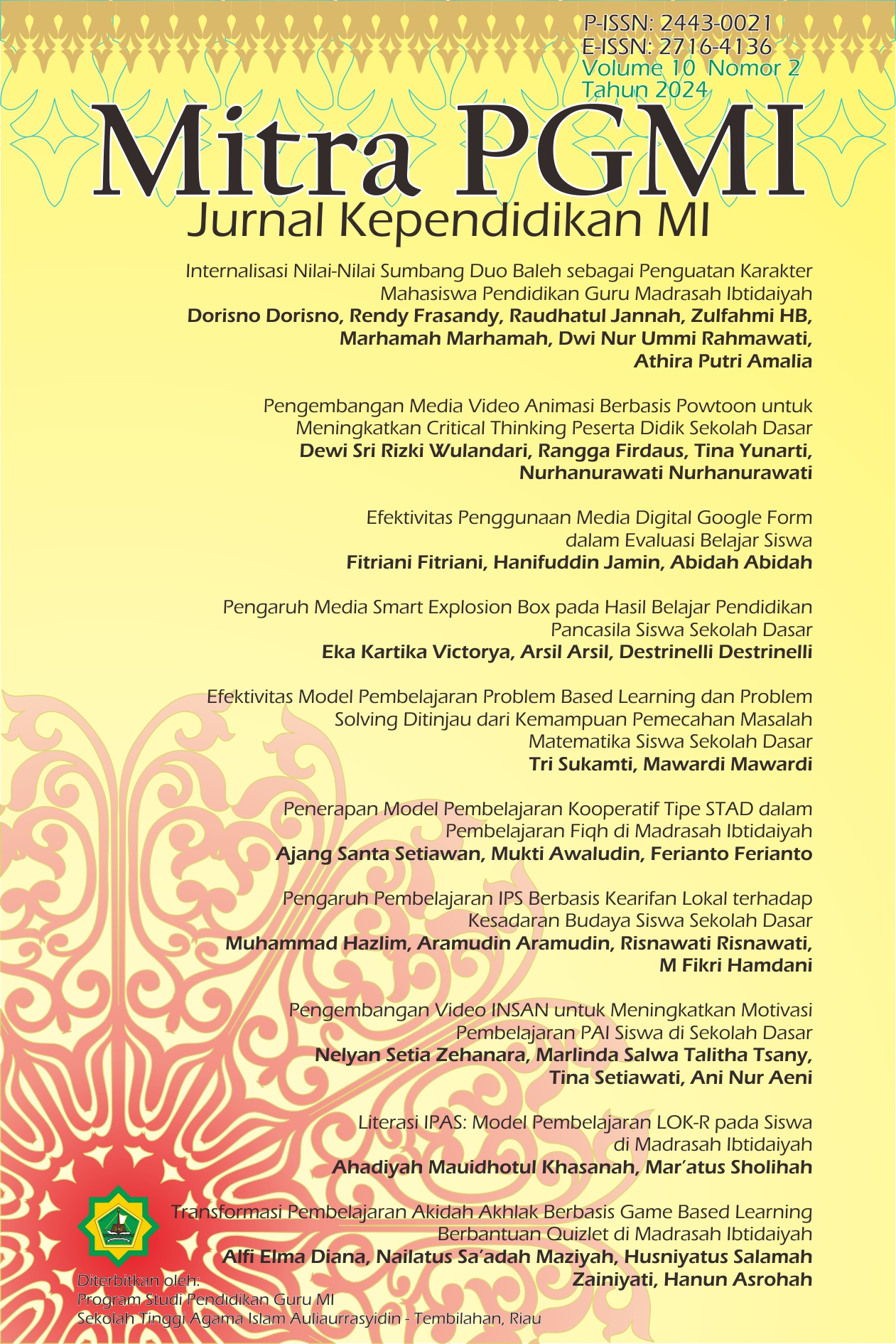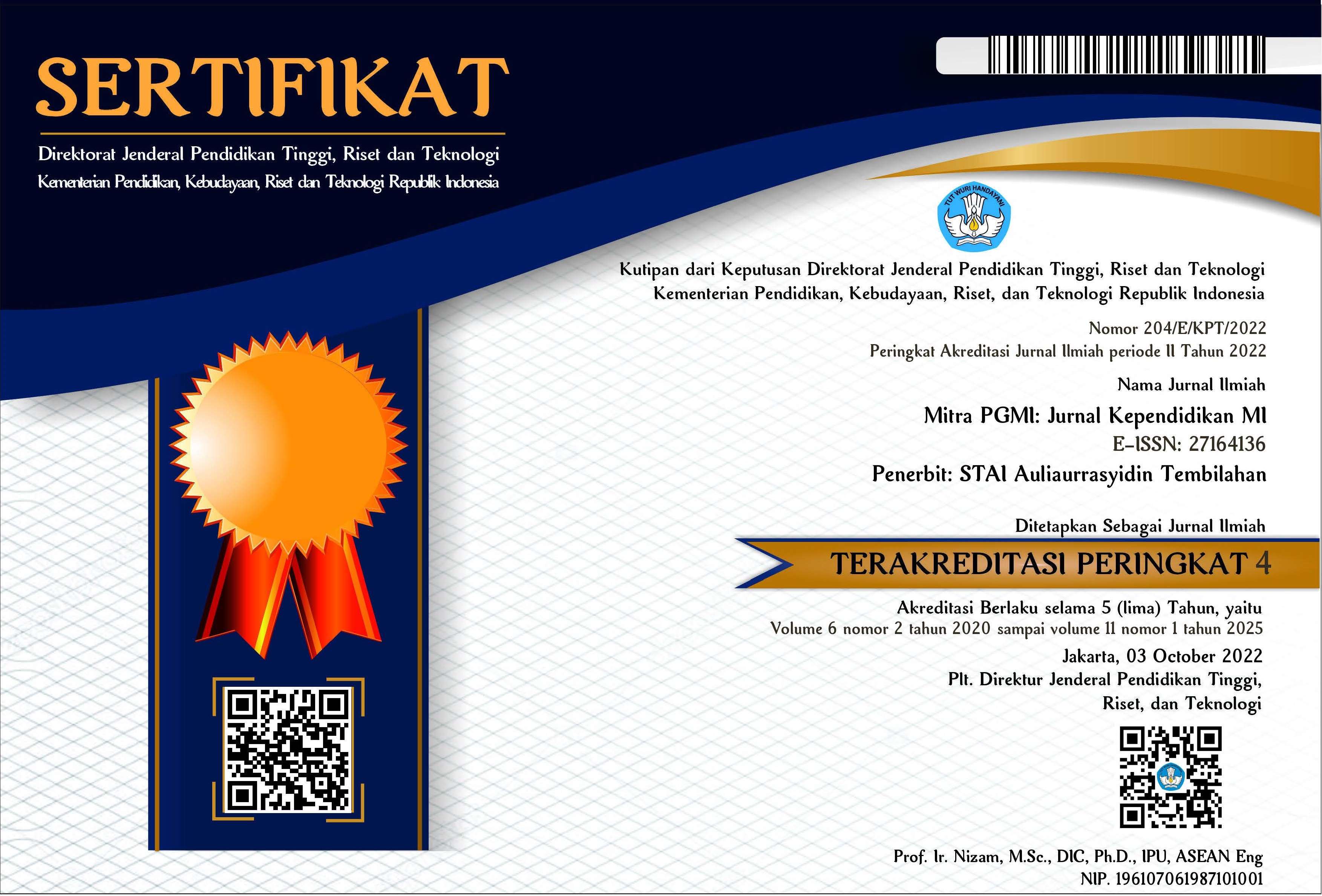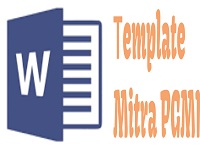Penerapan Model Pembelajaran Kooperatif Tipe STAD dalam Pembelajaran Fiqh di Madrasah Ibtidaiyah
DOI:
https://doi.org/10.46963/mpgmi.v10i2.1996Keywords:
STAD Model, Fiqh, Madrasah IbtidaiyahAbstract
This study aims to describe the implementation of STAD cooperative learning model in learning fiqh grade IV in madrasah Ibtidaiyah. The research used a qualitative approach with a case study method involving data collection through interviews, document study and observation. Data analysis used triangulation and research team group discussion. The research was conducted at Madrasah Ibtidaiyah Tarbiyatul Islam 01 Karawang involving teachers and grade IV students. The results of the study showed that the application of the STAD type cooperative learning model provided a number of positive impacts and results, such as increasing social interaction between students, strengthening collaborative skills, and building confidence in communicating and sharing ideas. This model also increases learning motivation, increases class participation, and encourages the development of problem-solving and critical thinking skills through group discussion and collaboration. Despite facing obstacles such as intensive preparation and effective group management, the application of the STAD model in Fiqh learning has a significant positive impact on the quality of learning and student learning outcomes.
Downloads
References
Abrori, M., & Hadi, M. S. (2020). Integral Values in Madrasah: To Foster Community Trust in Education. Istawa Jurnal Pendidikan Islam, 5(2), 160. https://doi.org/10.24269/ijpi.v5i2.2736.
Agasi, D., & Desyandri, D. (2022). Integrated Thematic Teaching Materials With PjBL Based on Book Creator Application in Grade IV Elementary School. Jurnal Ilmiah Sekolah Dasar, 6(4), 575–583. https://doi.org/10.23887/jisd.v6i4.52970.
Aisyah, A. P. K., Lestari, I. W., & Wafa, K. (2023). The Effectiveness of Student Team Achievement Division (Stad) on English Learning Outcomes and Student Learning Motivation. Exposure Jurnal Pendidikan Bahasa Inggris, 12(2), 313–319. https://doi.org/10.26618/exposure.v12i2.12708.
Alfina, F. T., Mustofa, A. N., & Setiawan, D. (2023). The Effect of Infographic Media Assisted by Aural Text on Improving Understanding of the Fiqh of Worship in Elementary School Students. Jurnal Penelitian Pendidikan, 40(1), 34–43. https://doi.org/10.15294/jpp.v40i1.45537.
Atoillah, M. T., & Ferianto, F. (2023). Pendidikan Multikultural Melalui Pendidikan Agama Islam Dalam Pembentukan Karakter Kebangsaan Siswa SMP N 1 Pangkalan. Jurnal Pendidikan, 32(1), 113–120. https://doi.org/10.32585/jp.v32i1.3485.
Belcher, B., & Halliwell, J. (2021). Conceptualizing the Elements of Research Impact: Towards Semantic Standards. Humanities and Social Sciences Communications, 8(1). https://doi.org/10.1057/s41599-021-00854-2.
Ferina, F. (2022). Stad as a Strategy of Teaching Reading Comprehension in Junior High School. Jeels (Journal of English Education and Linguistics Studies), 2(1), 29–43. https://doi.org/10.30762/jeels.v2i1.42.
Green, C., Eady, M., & Andersen, P. (2018). Preparing quality teachers. Teaching and Learning Inquiry, 6(1), 104–125. https://doi.org/10.20343/teachlearninqu.6.1.10.
Hardian, R. T., & Rakhmiyati. (2020). Fiqh Learning in Madrasah Ibtidaiyah. Kaunia, XVI(2).
Harli, H. (2022). The Use of Cooperative Method Type Student Teams Achievement Division as an Effort to Increase Student Learning Outcomes in Fiqh Subjects at the Integrated Madani Islamic Elementary School in Aceh Tenggara. Continuous Education Journal of Science and Research, 3(3), 1–9. https://doi.org/10.51178/ce.v3i3.960.
Khusna, N., Widiyono, Y., & Khaq, M. (2023). Improving Activity and Learning Outcomes Through the Student Team Achievement Divisions Learning Model for Elementary School Students. Pedagogik Journal of Islamic Elementary School, 6(1), 39–50. https://doi.org/10.24256/pijies.v6i1.2985.
Lackeus, M. (2015). Enterpreneurship in Education: What, Why, When, How (Https://www.oecd.org/cfe/leed/BGP_Entrepreneurship-in-Education.pdf (ed.)). OECD Publishing.
Lyon, J. A., & Magana, A. J. (2020). Computational Thinking in Higher Education: A Review of the Literature. Computer Applications in Engineering Education, 28(5), 1174–1189. https://doi.org/10.1002/cae.22295
Masnipal, M. (2020). Contribution of Indonesia cahaya method to the improvement of early childhood teachers’ skills. Integration of Education, 24(2), 218–234. https://doi.org/10.15507/1991-9468.099.024.202002.218-234.
Murniyanto, M., & Siswanto, S. (2022). Tahfidz Learning Management at Pesantren-based Higher Education. AL-TANZIM: Jurnal Manajemen Pendidikan Islam, 6(3), 814–825. https://doi.org/10.33650/al-tanzim.v6i3.3481.
Muslim, H. A., Japar, M., Yatimah, D., & Fitriyani, F. (2021). Social Skills : Learning Cycle Model and Student Team Achievement Divisions (STAD). Jurnal Educatio Jurnal Pendidikan Indonesia, 7(1), 29. https://doi.org/10.29210/120212723.
Nurkhamidi, A., Khuzaiyah, S., & Widodo, S. F. A. (2023). The impact of strengthening fiqh learning in the department of islamic education through integrating health sciences. Humanika, Kajian Ilmiah Mata Kuliah Umum, 23(1), 1-10. https://doi.org/10.21831/hum.v23i1.59185.
Nurtanto, M., Kholifah, N., Masek, A., Sudira, P., & Samsudin, A. (2021). Crucial Problems in Arranged the Lesson Plan of Vocational Teacher. International Journal of Evaluation and Research in Education (Ijere), 10(1), 345. https://doi.org/10.11591/ijere.v10i1.20604.
Putri, J., & Ferianto, F. (2023). Kemajuan Peradaban Islam Di Era Society 5.0. Wahana Karya Ilmiah Pendidikan, 7(01), 42–54. https://doi.org/10.35706/wkip.v7i01.9241.
Riis, J. O., Achenbach, M., Israelsen, P., Kyvsgaard Hansen, P., Johansen, J., & Deuse, J. (2017). Dealing with complex and ill-structured problems: results of a Plan-Do-Check-Act experiment in a business engineering semester. European Journal of Engineering Education, 42(4), 396–412. https://doi.org/10.1080/03043797.2016.1189881.
Sabrina, F. F., Darmiyanti, A., & BK, M. T. (2020). Kompetensi Manajerial Kepala Sekolah Untuk Meningkatkan Mutu Guru. Idaarah: Jurnal Manajemen Pendidikan, 4(2), 239. https://doi.org/10.24252/idaarah.v4i2.16740.
Setiyaningrum, D. (2020). Peningkatan Keaktifan Belajar Matematika Kelas VI SD Pada Materi Operasi Hitung Bilangan Bulat Melalui Model Pembelajaran Kooperatif Tipe STAD. Social Humanities and Educational Studies (Shes) Conference Series, 3(4), 739. https://doi.org/10.20961/shes.v3i4.54396.
Setiyaningsih, I., & Sujarwo, S. (2023). The STAD Learning Model Supported by Scientific Student Worksheets on Learning Outcomes and Collaboration Skills of Elementary School Students. International Journal of Elementary Education, 7(1), 154–161. https://doi.org/10.23887/ijee.v7i1.57964.
Sholeha, R., & Muassomah, M. (2021). STAD Type Cooperative Learning Model in Learning Understanding Abilities in MTs Nurul Islam Lumajang. Abjadia International Journal of Education, 6(1), 1–9. https://doi.org/10.18860/abj.v6i1.11230.
Sitika, A. J., Kejora, M. T. B., & Syahid, A. (2021). Strengthening humanistic based character education through local values and Islamic education values in basic education units in purwakarta regency. İlköğretim Online, 20(2), 22–32. https://doi.org/10.17051/ilkonline.2021.02.06.
Sittika, A. J., Taufik, M., & Kejora, B. (2022). Utilization of Google Glassroom in Islamic Religious Education in Higher Education during the Covid 19 Pandemic. 11(1), 62–70.
Sumitra, A., Nurunnisa, R., & Lestari, R. H. (2021). The Role of Teachers in Planning Early Childhood Learning. Proceedings of the 5th International Conference on Early Childhood Education (ICECE 2020), 538(Icece 2020), 90–93. https://doi.org/10.2991/assehr.k.210322.020.
Umam, C., & Ferianto, F. (2023). Model Pendekatan Humanistik Dalam Pengelolaan Kelas Pembelajaran Pendidikan Agama Islam SDN Palumbonsari 1. ANSIRU PAI: Pengembangan Profesi Guru Pendidikan Agama Islam, 7(2), 336–344..
Verawati, N. N. S. P., Harjono, A., Wahyudi, W., & Gummah, S. (2022). Inquiry-Creative Learning Integrated With Ethnoscience: Efforts to Encourage Prospective Science Teachers’ Critical Thinking in Indonesia. International Journal of Learning Teaching and Educational Research, 21(9), 232–248. https://doi.org/10.26803/ijlter.21.9.13.
Wibowo, A., & Masruro, S. (2022). The Effect of Role Playing Type of Cooperative Model on the Indonesian Learning Outcomes of Elementary Students. Acitya: Journal of Teaching and Education, 4(1), 101–109. https://doi.org/10.30650/ajte.v4i1.3197.
Wiratno, W., & Ardini, D. A. (2022). Improving Reading Comprehension on Descriptive Text Through STAD for the First Year Students. Journal of Development Research, 6(2), 224–229. https://doi.org/10.28926/jdr.v6i2.259
Yang, Y. (2024). Formative Assessment: A Significant Facilitator of Student Learning. Science Insights Education Frontiers, 20(2), 3219–3221. https://doi.org/10.15354/sief.24.co267.
Zumrotus Sa’diyah, & Firda Zakiyatur Rofiah. (2021). Pembelajaran Fiqh di Madrasah Ibtidaiyah Al-Asyhar Jelu Ngasem Bojonegoro. Pedagogika: Jurnal Ilmu-Ilmu Kependidikan, 1(1), 129–134. https://doi.org/10.57251/ped.v1i1.509.
Downloads
Published
Issue
Section
License
Copyright (c) 2024 Ajang Santa Setiawan, Mukti Awaludin, Ferianto Ferianto

This work is licensed under a Creative Commons Attribution-ShareAlike 4.0 International License.
Authors who publish with this journal agree to the following terms:
1. Copyright on any article is retained by the author(s).
2. The author grants the journal, right of first publication with the work simultaneously licensed under a Creative Commons Attribution shareAlike 4.0 International License that allows others to share the work with an acknowledgment of the work’s authorship and initial publication in this journal.
3. Authors are able to enter into separate, additional contractual arrangements for the non-exclusive distribution of the journal’s published version of the work (e.g., post it to an institutional repository or publish it in a book), with an acknowledgment of its initial publication in this journal.
4. Authors are permitted and encouraged to post their work online (e.g., in institutional repositories or on their website) prior to and during the submission process, as it can lead to productive exchanges, as well as earlier and greater citation of published work.
5. The article and any associated published material is distributed under the Creative Commons Attribution-ShareAlike 4.0 International License








2.png)


